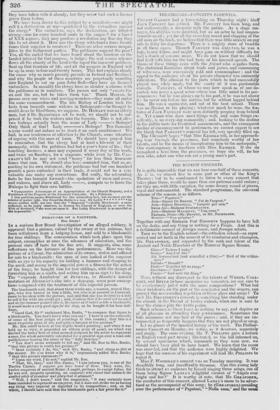:roh.i . uNza or A PAINTiriCi.
lieu Gloria
hr a curious Bow Street investigation of an alleged robbery, it appeared that a picture, valued by the owner at ten guineas, had been withdrawn from a lodging-house, and sold to a blacksmith for four shillings. The conversation which took place upon this subject, exemplifies at once the advances of education, and the present state of taste for the fine arts. It suggests, also, some reflections on the fortunes of fine performances. Here was the picture of a Caesar, the admiration of its owner, stolen and offered for sale to a blacksmith: the man of iron looked at the emperor with art eye to his capacity for holding a hammer and stooping to the anvil, and seeing in the imperial person a fitness for the action of the forge, he bought him for four shillings,'with the design of furnishing him as a smith, and setting him up as sign to his shop. The " expende Annibalem" of JUVENAL, or Hamlet's fancied mutation of Alexander's clay into a stop-gap, seem poor concep- tions compared with the treatment of this imperial person.
The blacksmith said, that about three weeks ago, a woman, named 'Mor- gan, who was known to him a little, but who is at present in Cornwall, came to his shop with the picture, and said that she was desired by a lady to sell it for what she could get ; and, thinking that if he could get an (Inca and sIdge-hammer painted into it, thefigure on it looked so like a blacksmith, it would make a very good sign for his shop, so he bought it for four shil- lings. "Good God, Sir I" exclaimed Mrs. Banks, "to compare that figure to a blacksmith. You don't know what you say I I have it on the authority of some of the best judges of paintings in this country, that this is a most exquisite piece of art, and quite a bargain at ten guineas." - Mr. Roe asked to look at this highly-lauded painting ; and when it was held up to view, it presented an oblong piece of panel, on which was daubed the bulky bust of what seemed designed by the artist to represent a man, the whole admirably calculated for a pendent sign over a road-side publichouse bearing the name of the "Jolly Butcher."
" You don't mean seriously to tell me," said Mr. Roe to Mrs. Banks, "that this picture is worth ten guineas ?" " Most certainly I do, Sir," said Mrs. Banks, "and cheap as dirt at the money. Do you know who it is," impressively added Mrs. Banks, " that this picture represents ?" " Upon my word, I do not," replied Mr. Roe.
" That, Sir, then," said Mrs. Banks, " I can inform you, is one of the TWelve Caesars. I suppose you have heard of them. They were, Sir, twelve emperors of ancient Rome (I ought, perhaps, to except Julius, for be was not, properly speaking, an emperor) who raised that nation to the exalted pitch of grandeur and glory that it attained."
-" Well, I don't know," said the magistrate, " it may certainly have been intended to represent an emperor, but it does not strike me as having any thing very imperial or dignified in its composition ; and, on the whole, L should have said that the blacksmith gave a fair price for it."


















 Previous page
Previous page